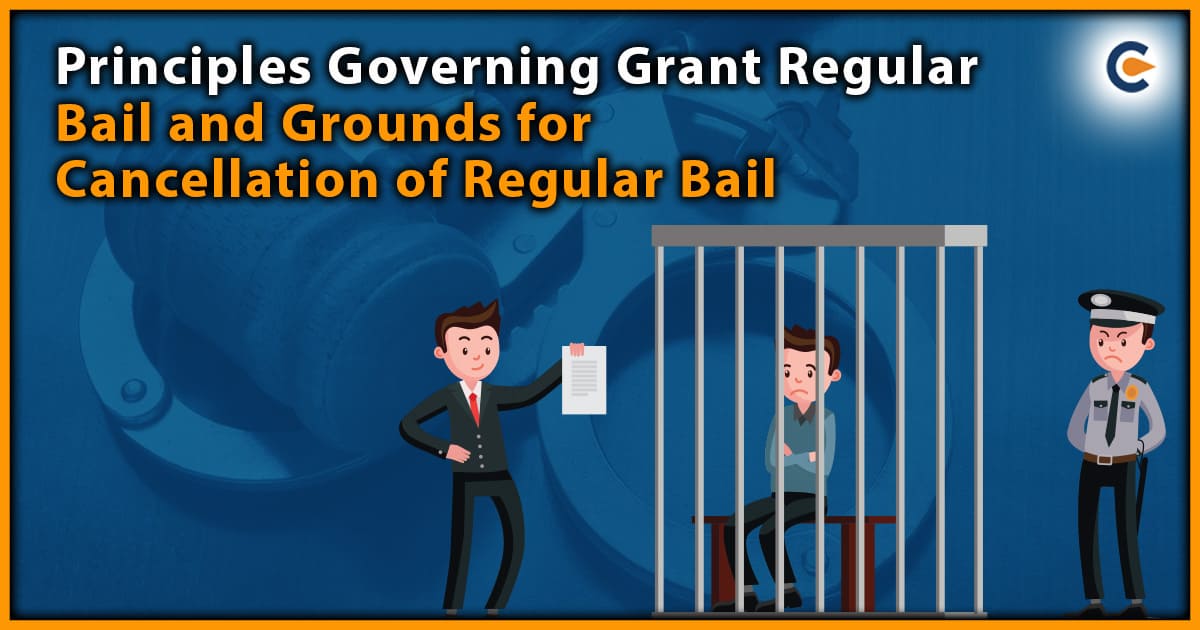Bail is a legal procedure that allows an accused person to be released from custody while awaiting trial. The purpose of bail is to ensure that the accused person attends court and does not pose a threat to society. Regular bail refers to the bail granted by a court during the pendency of a trial. We discuss Principles Governing Grant Regular Bail and Grounds for Cancellation of Regular Bail.
Regular bail is the temporary release of an accused person from custody during the trial process. It is granted by a court of law and allows the accused to remain free until their trial is concluded. Regular bail is usually granted in non-bailable offenses or where the court finds that there are no reasonable grounds to believe that the accused has committed the offense.
Importance of Understanding the Principles Governing Grant Regular Bail
It is essential to understand the principles governing the grant of bail to ensure that the accused person’s right to liberty is protected. The principles governing bail include the presumption of innocence, the right to liberty, and the discretionary power of the court. These principles ensure that an accused person is not subjected to unnecessary or excessive restrictions while awaiting trial. Furthermore, understanding the grounds for the refusal or cancellation of regular Bail is crucial to prevent misuse of the bail system and ensure public safety.
Principles Governing Grant of Regular Bail
Regular bail is granted by the court to ensure that the accused person is not subjected to unnecessary or excessive restrictions while awaiting trial. The following are the principles governing the grant of regular bail:-
Presumption of Innocence
Every person is presumed innocent until proven guilty. The burden of proving the guilt of the accused person lies with the prosecution. Therefore, the accused person should not be deprived of their liberty unless there are reasonable grounds to believe that they have committed the offense.
Right to Liberty
Every person has the right to liberty and security of person. This right is protected under the Constitution and international human rights instruments. The court should, therefore, ensure that the accused person’s right to liberty is protected while awaiting trial.
Discretionary Power of the Court
The court has discretionary power to grant or refuse bail. The court should consider all relevant factors in deciding whether to grant regular bail or not.
Relevant Factors in Granting Bail
The following factors are relevant in deciding whether to grant regular bail or not:–
·Seriousness of the offense
· Likelihood of the accused person fleeing from justice
· Danger posed to society if the accused person is released on bail
· Whether the accused person has a past criminal record
· Whether the accused person is likely to interfere with the investigation or prosecution of the case
The court should consider all relevant factors and make a decision that is in the interest of justice. The decision should not be based on extraneous considerations such as the social status or political affiliations of the accused person.
Grounds for Refusal of Regular Bail
While the court has the discretion to grant regular bail, there are circumstances under which bail may be refused. The following are the grounds for the refusal of regular bail:
Non-Bailable Offenses
Certain offenses are non-bailable, which means that the accused person cannot be granted bail as a matter of right. Examples of non-bailable offenses include murder, treason, and terrorism.
Reasonable Suspicion of Guilt
If the court has reasonable suspicion that the accused person has committed the offense, bail may be refused. In such cases, the court may require the accused person to remain in custody until the trial is concluded.
Possibility of Obstruction of Justice
If there is a possibility that the accused person may interfere with the investigation or prosecution of the case, bail may be refused. This is to ensure that the trial process is not compromised.
Past Criminal Record or History of Non-Appearance
If the accused person has a history of non-appearance or has a past criminal record, bail may be refused. This is to ensure that the accused person attends court and does not pose a threat to society.
Flight Risk
The court should carefully consider all relevant factors and make a decision that is in the interest of justice. The decision should not be based on extraneous considerations such as the social status or political affiliations of the accused person.
If there is a possibility that the accused person may abscond and not attend court, bail may be refused. This is to ensure that the trial process is not delayed and justice is not compromised.
Grounds for Cancellation of Regular Bail
Regular bail may be cancelled if the accused person breaches the conditions of bail or engages in conduct that undermines the purpose of bail. The following are the grounds for the cancellation of regular bail:
Breach of Conditions of Bail
If the accused person breaches any of the conditions of bail, such as failing to attend court or failing to report to the police as required, bail may be cancelled. The court may also impose additional conditions or revoke bail altogether.
Commission of Another Offense While on Bail
If the accused person commits another offense while on bail, bail may be cancelled. This is to ensure that the accused person does not pose a threat to society and to protect the integrity of the justice system.
Misrepresentation or Concealment of Material Facts
If the accused person has made misrepresentations or concealed material facts while applying for bail, bail may be cancelled. This is to ensure that the court has accurate and complete information when deciding whether to grant or refuse bail.
Public Interest Considerations
The court may cancel bail if it is in the public interest to do so. This may be the case where the accused person poses a threat to society or where there is a risk of interference with the administration of justice.
The court should carefully consider all relevant factors and make a decision that is in the interest of justice. The decision should not be based on extraneous considerations such as the social status or political affiliations of the accused person.
Landmark Case Laws Related To Grant and Cancellation of Bail in India
There have been several landmark cases in India that have established important principles governing the grant and cancellation of regular bail. Some of these cases are:
State of Rajasthan v. Balchand
This case established the principle that the grant of bail is the rule and refusal is the exception. It was held that bail should be granted unless there are compelling reasons to refuse it.
Gudikanti Narasimhulu v. Public Prosecutor
This case established that the primary consideration when granting bail is the likelihood of the accused person absconding or interfering with the administration of justice.
Sanjay Chandra v. CBI
This case established the principle that the courts should not take a mechanical approach when deciding whether to grant regular bail. The court should carefully consider all relevant factors and make a decision that is in the interest of justice.
Siddharam Satlingappa Mhetre v. State of Maharashtra
This case established that while deciding whether to grant regular bail, the court should consider the nature of the offense, the severity of the punishment, the likelihood of the accused person absconding or interfering with the administration of justice, and the strength of the prosecution case.
State of U.P. v. Amarmani Tripathi
This case established that the grant regular bail should not be based on extraneous considerations such as the social status or political affiliations of the accused person.
Arnesh Kumar v. State of Bihar (2014)
This case established the need for the police to conduct a preliminary investigation before making an arrest in cases under Section 498A[1] of the Indian Penal Code, which deals with cruelty against married women. The court also held that automatic arrests and denial of bail in such cases are not justified.
Dataram Singh v. State of Uttar Pradesh (2018)
In this case, the Supreme Court of India held that the accused person has a right to regular bail, and that bail should not be denied merely because the trial is likely to take a long time. The court also held that the accused person has a right to default bail if the investigating agency fails to file a charge sheet within the prescribed period.
Gurbaksh Singh Sibbia v. State of Punjab (1980)
This landmark case established that bail is a rule and jail is an exception. The court held that bail should not be refused unless there is a strong likelihood of the accused person absconding, tampering with evidence, or interfering with the administration of justice.
Kalyan Chandra Sarkar v. Rajesh Ranjan (2004)
In this case, the Supreme Court of India held that the court should consider the availability of evidence, the stage of the trial, and the possibility of the accused person absconding or tampering with evidence, when deciding on bail. The court also held that the bail granted should not be cancelled unless there is a compelling reason to do so.
These landmark cases have played an important role in shaping the principles governing the grant regular bail and cancellation of regular bail in India.
Conclusion
In conclusion, it is important to respect the principles governing the grant regular bail in order to ensure that the justice system operates fairly and efficiently. Bail is a fundamental right, and it should only be refused or cancelled in exceptional circumstances. The courts have discretion in granting bail, but this discretion should be exercised carefully and with due regard to the relevant factors.
Grounds for refusing or cancelling bail should be carefully considered to ensure that they are based on legitimate concerns such as the risk of flight or obstruction of justice. Decisions should not be based on extraneous considerations, and the accused person should always be presumed innocent until proven guilty.
In sum, respecting the principles governing the grant regular bail is crucial for upholding the rights of the accused, protecting the integrity of the justice system, and ensuring public safety.
Read our Article:What Is The Difference Between Bail And Anticipatory Bail?











